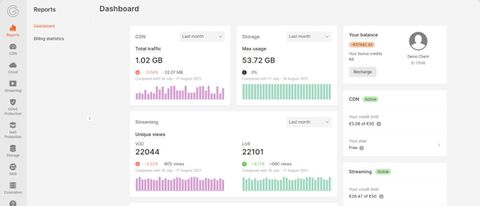TechRadar Verdict
A low cost but capable CDN with a large network and some very advanced features.
Pros
- +
Large network includes 20+ PoPs in Europe and 35+ PoPs in CIS
- +
Well-designed web console
- +
Loads of features
- +
Generous free plan
Cons
- -
Mixed speed results at CDNPerf
- -
Support site lacks detail in some areas
Why you can trust TechRadar
Founded in 2011 to support online gaming, Luxembourg-based Gcore Labs (formerly branded as G-Core) now offers powerful management hosting packages and a capable CDN.

Gcore's network covers more than 130 locations across five continents, significantly more than most competitors. The company hasn't just crammed most of them into Europe and North America, either.
CIS countries are covered by 35+ points of presence (PoPs), there are twelve in Asia, and others in Brazil, Istanbul, Dubai and Australia. That networks extends to 7000+ peer-to-peer partners and connections with major telecom operators.
The core service is a pull CDN, where Gcore automatically grabs files from your servers as they're needed, with a claimed average response time of 25ms. A prefetching feature enables loading files before they're first requested, ensuring users always get the best possible performance. There's optional origin push support (Gcore stores all your content, reducing the load on your server) at extra cost.
- Want to sign up for Gcore? Check out the website here
Security features include free shared SSL and Let's Encrypt certificates, and the option to use your own custom SSL certificate at no extra cost. There are plenty of content protection and access control settings, too - more on those in a moment.
Elsewhere, a decent feature set includes support for HTTP/2 and IPv6. Custom HTTP rules allow you to define exactly how and when content is cached and served, an 'Instant Purge' (which actually takes 'several minutes') feature clears the cache whenever you like, and there's a REST API to help automate any complex tasks.
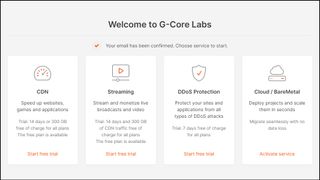
It's easy to miss on the CDN area of the website, but Gcore also has an excellent media platform which supports live streaming up to 4K, VOD and transcoding, optionally with its own HTML5 media player.
Pricing
Gcore CDN has a simple pricing structure where you pay a flat rate for the traffic you're using, with no variations for particular countries or continents.
The Start plan gives you 1.5TB of traffic a month for 35 Euros ($40), or $0.038 per GB, with an overage charge of $0.026 per GB. There's no charge for requests unless you top the not unreasonable limit of a billion a month (and even if you do, overage is only €0.0075 per 10,000 extra requests.) Support is limited to email during business hours only (8-5.)
The PRO 5TB plan includes 5TB traffic for 100 Euros ($114) a month, with an overage charge of €0.02, and adds 24/7 support by email, live chat and phone.
As you'll guess, the PRO 10TB plan gets you 10TB traffic for 150 Euros ($171), with an overage charge of €0.015 per GB if you need more.
That looks like great value to us. Fastly, CloudFront and others charge from $0.12 per GB, four times Gcore's price, then add more for traffic from some locations, and charge extra for requests, too.
Gcore hasn't finished yet, though. A 14-day trial comes with 300GB of free traffic, while a generous free plan gives you an ongoing 1TB a month. This only gives you access to a fraction of Gcore's network (28 PoPs vs. 140+ for the commercial plans), includes only the most basic features, and has no support beyond the web knowledgebase, but it's still a handy risk-free way to find out just how Gcore CDN works.

Setup
Gcore's web dashboard doesn't always work as smoothly as we'd like. 'You must resume your service', it warned us, sternly, when we tried to reactivate an old account. We clicked the Resume button. 'Choose a plan', said the site, without giving us any plan options. The site said it had no payment method, so maybe that was the problem? '404 - Page Not Found', the control panel told us, when we tried accessing the Payment Methods area.
We created a new account, and this time there no issues. In a couple of minutes, we were browsing Gcore's web dashboard.
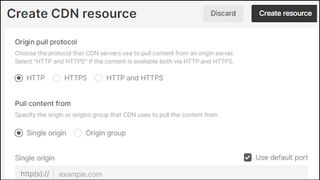
Setup is reasonably straightforward, as least by CDN standards. A large 'Create CDN Resource' button points you to your first step; the initial Create form is short, default settings are well chosen, and you could start by entering just your origin server (the source domain or IP address).
There are other options for more experienced users. The CDN can pull content from a single source or a group, optionally with a custom port. It can connect only via HTTP, only via HTTPs, or choose automatically. You're able to use a shared SSL certificate, generate a free Let's Encrypt certificate, or add a standard or wildcard certificate of your own.
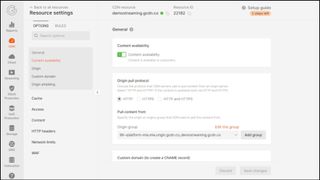
The well-designed interface doesn't assume you're a CDN guru. Jargon is kept to the service basics, text boxes initially display example entries, and there's a caption under each setting to explain exactly what it does. It's both more powerful and usable than most of the competition.
There's more help available on Gcore's Knowledgebase. This has a lot of information, but articles can sometimes be lengthy, yet still don't always have the detail a novice might need. Check out the 'Create and integrate a CDN resource' page for more guidance on how to get started with the service, and to see whether Gcore's tutorials will work for you.
Features
Gcore's default CDN settings are a good place to start, but there are plenty more options available if you need them.
These start with origin shielding, where you can specify a CDN server to handle requests in the event of a cache miss (a simple way to reduce the load on your origin server).
Caching options (deciding when content expires) enable choosing whether this is controlled by your origin server or the CDN, and setting a cache expiry time (a lengthy 4 days by default, but can be set as low as 10 seconds, or to whatever custom value you like.)
If your server provides no caching HTTP headers, Gcore will only cache content with 20x (successful) or 30x (redirect) HTTP codes, ignoring 40x and 50x error codes. That's another sensible default option, but the service also recognizes that you might want to serve stale cached content in some situations (if your origin server is down for some technical issue), and you can control that, too.
Compression features range from GZip and Brotli support to a Large Files Delivery Optimization option which enables caching files larger than 10MB in separate parts.
A lengthy list of security tools allows you to control access by secure token, IP ranges, referrer, country, user agents and more. This gives you plenty of ways to limit hotlinking or other unwanted access to your content, and you can read a basic outline of what's available on the support site.
If the menu settings don't quite give you what you need, Gcore's Rules dialog provides fine-tuned control which enables matching URLs with literal text or regular expressions, applying new caching rules, configuring access in various ways (country, IP address, referrer, secure token, user agent, HTTP method and more), adding custom headers, and generally taking full control of what's going on.
This is by far the most complex set of functions Gcore has to offer. Rule creation isn't fully described in the support pages, and you'll need plenty of CDN and HTTP header experience to understand what's possible. But if that's not an issue, you'll find an enormous amount of power and flexibility available here.

Once you're up and running, Gcore's Dashboard keeps you up-to-date with attractive and informative reports on CDN traffic, bandwidth, response codes, cache hit ratio and requests per second. You can filter by time to view anything from the last hour to a full month, or you're able to view aggregated data over the last year.
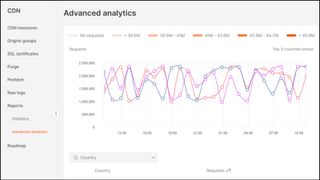
Advanced Analytics takes reporting even further, with details on cache use by location, directories, devices, browsers, operating systems and more.
Support is available 24/7, including by live chat, email and ticket. We tried the chat service and had accurate and helpful replies to our questions within a couple of minutes, much better than we typically see elsewhere.
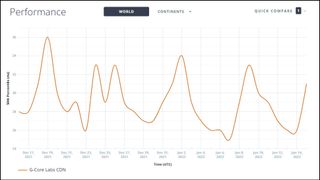
Performance
Comparing CDNs is a challenge, as there are so many variables to consider: the numbers and locations of your visitors, the size and type of files, how often they're updated, the web applications you're using, and more. Change any element and you could get a different result.
One simple approach is to just look at average CDN response time. It's only a single figure and can't begin to tell you the whole story, but it's still a useful metric which gives a basic idea of how fast a service may appear.
As we write, CDNPerf ranks Gcore as 9th out of 21 for worldwide response times. While that might seem very ordinary, it's only fractionally behind some big-name services (AWS, Akamai and Fastly are ranked 5, 6 and 7) and just ahead of a few others (Azure, Cloudflare).
Drilling down to continent-level performance revealed some interesting variations. Gcore rated a lower mid-range 13th in Oceania, 14th in North America and 15th in Africa. But it made an impressive 6th place for response times in Europe, and reached a very respectable 8th place for South America (an area poorly served by many services.)
Overall, Gcore offers decent performance which is in line with many other enterprise CDNs. It's difficult to say precisely how it will work for you, as this depends on your setup and whether you can use advanced features like Gcore's rules, but we would recommend taking the free trial to see for yourself.
Final verdict
Gcore is a quality service with a large network, a well-designed web dashboard and loads of useful reports and CDN analytics. We'd like to see more detailed help and guidance on the website, but there's no doubt you get a lot here for a very low price, and Gcore is a must for your CDN shortlist.
We’ve also highlighted the best CDN

Mike is a lead security reviewer at Future, where he stress-tests VPNs, antivirus and more to find out which services are sure to keep you safe, and which are best avoided. Mike began his career as a lead software developer in the engineering world, where his creations were used by big-name companies from Rolls Royce to British Nuclear Fuels and British Aerospace. The early PC viruses caught Mike's attention, and he developed an interest in analyzing malware, and learning the low-level technical details of how Windows and network security work under the hood.
